Tree Names

Nature names are a great way to connect our kids with the world that sustains us. And arguably, no other nature name category has the symbolism and strength of tree names! You don’t have to name your kid Pine or Dogwood (although hey, we’re not here to judge!) — but there are plenty of actual tree names that are wearable for, well, an actual human. Then there are tree-inspired names that are a more subtle, but still meaningful, tribute to our forests.
So … why give your child a tree name? Because trees are nothing short of amazing, just like your little one! They are absolutely crucial to maintaining life on this planet as we know it, regulating our atmosphere, combating climate change, and providing vital habitats for all sorts of living things. And that’s just the science-y part; trees have also served as powerful symbols across cultures worldwide for millennia. Generally speaking, trees symbolize growth, life, and resilience. Just imagine a tiny seed sprouting into a towering giant, or a tree withstanding a powerful and destructive storm — that’s pretty inspiring! Many cultures view trees as a connection between heaven and earth, their roots anchoring them to the ground while their branches reach for the sky. And each variety of tree has a different symbolic quality; willow trees symbolize peace, for example, while oak trees represent sturdiness and stability. So you can choose a tree name that conveys the positive traits you hope your child will have.
From Alder to Willow, there are a plethora of tree names for boys and girls (and plenty of gender-neutral options, too!) that pay homage to the beauty, strength, and vitality of these natural wonders.
More from SheKnows
Best of SheKnows
Iskra Lawrence & Philip Payne, & All the Other Celebrity Pregnancy Announcements of 2024
Allyson Felix & More Celebrities Who Welcomed Babies in 2024
Willow

With long, flowing branches that gracefully sway in the breeze, the beautiful willow tree is a symbol of resilience and adaptation. Its branches bend without breaking in the face of strong winds and harsh weather. Even more impressive, a new willow tree can grow from a small cutting — a testament to its power of renewal and rebirth. Across cultures, the willow has many symbolic meanings: immortality, protection from evil, and good luck, just to name a few.
Juniper

There are so many cool things about juniper trees. Since their wood has an aromatic smoke when burnt, it was used in ancient times for the ritual purification of temples; it was believed that the smoke accentuated clairvoyance. Its berries have been used for centuries for medicinal and culinary purposes (juniper berries are, to this day, the primary flavoring of gin). The juniper tree has many symbolic meanings, including strength, wisdom, usefulness, and beauty; its strength is proven by its ability to survive in harsh climates, growing out of rocks and surviving in areas with very little water.
As far as names are concerned, this one has the very adorable nickname possibilities of June or Junie.
Cassia
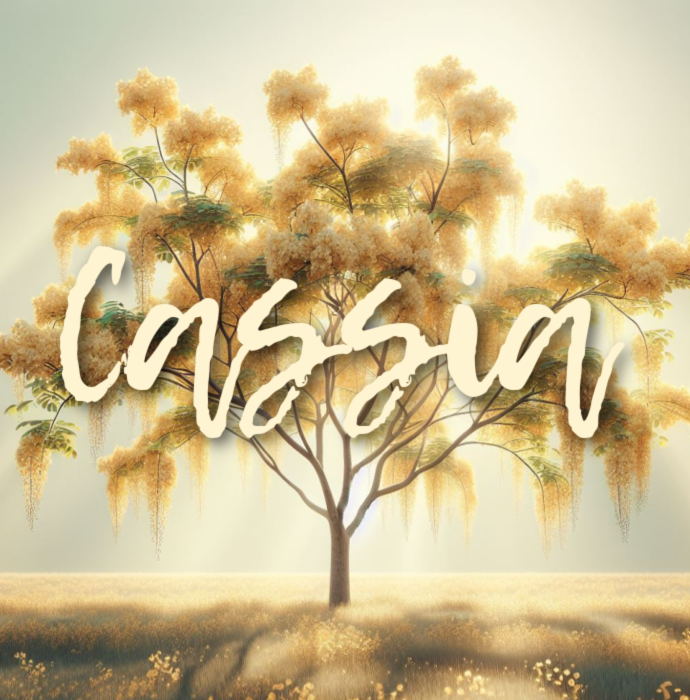
If you want a kid that’s sugar and spice, Cassia is a great name choice — because some varieties of cinnamon (yes, there’s more than one!) come frm the cassia tree! In the Bible, cassia was a principal spice of the Holy Anointing oil used to anoint priests, kings, and their garments; it has long been regarded as representing dedication, devotion, and moral integrity.
Cassia can also be the feminine form of Cassius, an ancient Roman family name that means “vain.”
Hazel

The hazel tree has been associated with magical properties in European mythology and folklore — especially in Ireland. In Celtic lore, the hazel is associated with wisdom, authority, and inspiration. In Norse, Roman, and Celtic mythology, the hazel is known as the Tree of Knowledge, and its nuts symbolize wisdom.
The name Hazel comes from the Old English word hæsel, meaning “rod of power.”
Magnolia

One of the first (and most beautiful) harbingers of spring is the magnolia tree. Boasting a lineage that stretches back over 100 million years, the magnolia genus ranks among the planet’s most ancient. Evidence suggests these early trees bore the first flowers on Earth, blooms remarkably similar to their modern counterparts — which are believed to have played a role in the evolution of pollinating insects, paving the way for the incredible diversity of plant and animal life we see today. Therefore, the magnolia tree is said to symbolize longevity, endurance, and perseverance.
Since the magnolia tree was named after French botanist Pierre Magnol, the name doesn’t have a specific meaning — but it does have the option of cute nicknames such as Maggie, Nola, and Lia!
Senna

The senna tree goes by many alternate names: candle bush and Emperor’s candles, to name a couple, alluding to its clusters of bright yellow flowers. But senna is said to stem from the Arabic transcription sanā, meaning “brilliance” or “radiance.” Throughout history, the senna tree has been highly regarded for its medicinal use, thought to cleanse the body of toxins and purify the blood — they have antibacterial, antioxidant, antifungal, and antiviral properties.
Melia
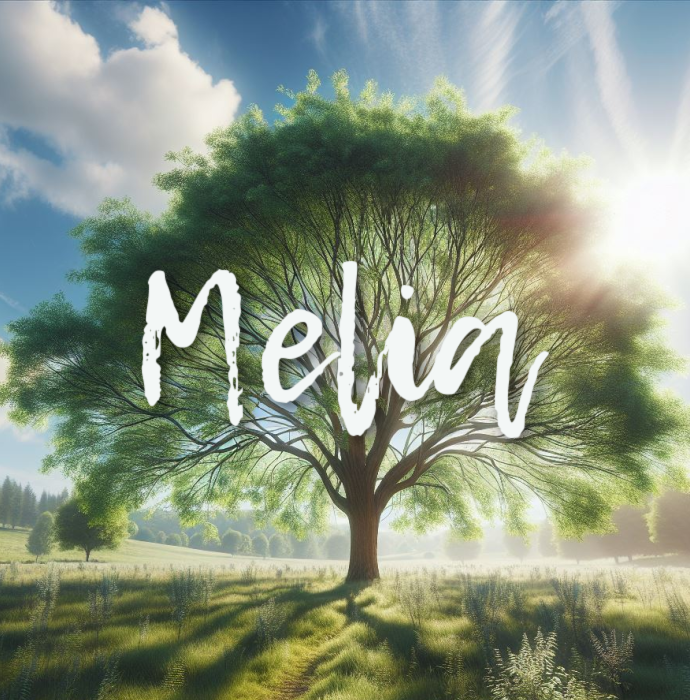
Melia is not a tree name — well, at least not directly. But it does come from the Greek μέλι (meli), which means “ash tree!” The ash tree has been a symbol of life, magic, and healing for centuries. In Norse mythology, the ash tree is known as the “Tree of Life” and is considered a cosmic pillar that connects the heavens, Earth, and underworld (the first man on Earth is said to have come from an ash tree). They are associated with life force energy and creativity.
Sylvia

Like Melia, Sylvia is another one of our tree names inspired by trees. It comes from the Latin name Silvius, which is derived from the Latin silva, meaning “forest.” And it also comes with the nickname option Sylvie.
Holly

We may think of holly mainly as a seasonal decoration, but its history is rich with symbolism. In Christianity, it represents eternal life and resurrection. And its prickly leaves are said to symbolize protection; in Celtic mythology, the holly tree is sacred and associated with peace and goodwill. In Norse mythology, the holly tree is associated with thunder, and people planted it near homes to protect people from lightning strikes. It is also associated with strength, since it’s an evergreen that looks strong and vital even in the coldest winter months.
Laurel

Derived from the Latin laurus, laurel trees have symbolized victory, honor, and achievement since the days of ancient Greece and Rome. In ancient Greece, wreaths made of laurel leaves and branches were worn as crowns to represent victory in sporting events. In the Middle Ages and Golden Age, laurel represented poetry, power, military triumph, and the gift of prophecy. Today, laurel is associated with achievement — a laureate is someone who has received an award or achievement. And with the longstanding popularity of names like Lauren and Laura, Laurel is a standout that you don’t hear as often.
Olive
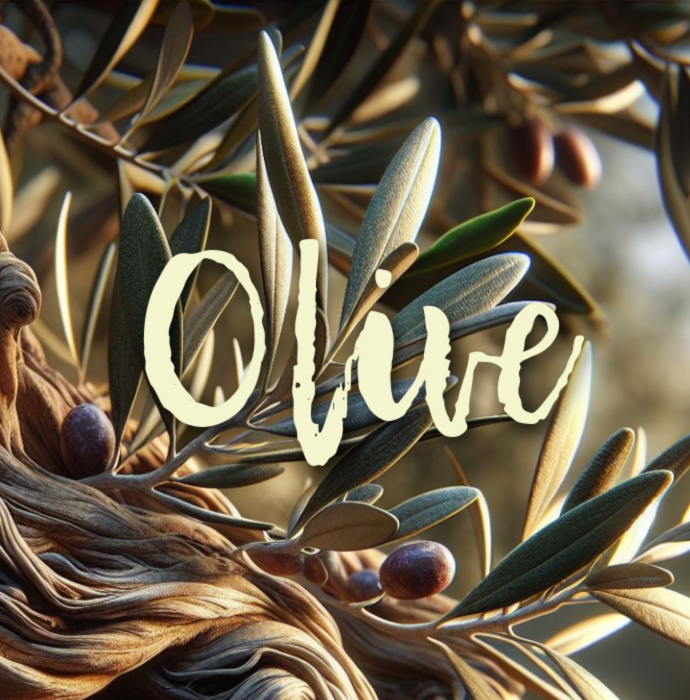
The olive tree can live for centuries, so it is sometimes referred to as the Tree of Life. It has many other symbolic meanings — wealth, prosperity, valor, and a future full of joy and serenity — but perhaps its most commonly known trait is that it’s a representative of peace (ever heard of someone “extending an olive branch?).
Ayla

Ayla is another tree-adjacent name, an alternate spelling of the Hebrew name Elah, meaning “terebinth tree.” They are very significant trees in the Bible; the terebinth tree is translated as “trees of righteousness” in Isaiah 61:3. They can sprout from a stump, even after being cut down, and can stay green even through years of drought, so they symbolize strength and power.
Elowen

This gorgeous tree name is actually Welsh — coming from the Cornish word “elowen,” meaning “elm tree!” Elm trees have been associated with the underworld in many mythologies. In Celtic mythology, elm trees are associated with elves and the passageway to the underworld. In Norse mythology, the World Tree (Yggdrasil) is sometimes depicted as an elm tree, with roots that connect the mortal world to the afterlife. In Ancient Greek folklore, elm trees are said to have sprouted to life when Orpheus played his harp for his wife while rescuing her from the underworld. And folk legend says that falling asleep under an elm tree or putting some leaves under your pillow will give you prophetic dreams.
Samara

When you were little, if you played around any maple, ash, or elm trees, chances are you plucked their dry seeds off the ground and tossed them in the air, where they’d twirl back down. Most people know these as “helicopter seeds” — but did you know they’re actually called “samara?” Thus, this is the perfect tree name, super-subtle but still pertinent!
Aspen
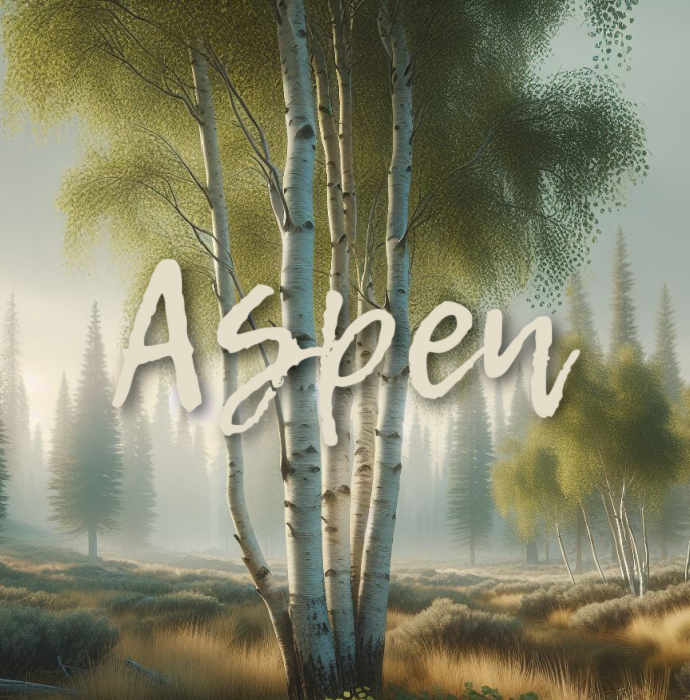
Aspen isn’t just synonymous with Colorado and skiing — in fact, it’s the abundance of aspen trees that gave the resort town its name. The aspen’s Greek name is aspis, which means “shield”. Because of this, the aspen has been seen as a symbol of protection, and people have often planted them outside their homes. The Greeks also believed that the aspen had magical powers, and used its leaves in the crowns of heroes. In Celtic mythology, aspen trees symbolized protection and transformation, with their leaves resembling tiny coins. In China, aspen symbolizes justice, integrity, and an unshakable fighting spirit.
As a name, it’s a truly unisex choice, as wearable on boys as it is on girls! If you wanted to make it a bit more feminine-leaning, you could spell it Aspyn.
Ash
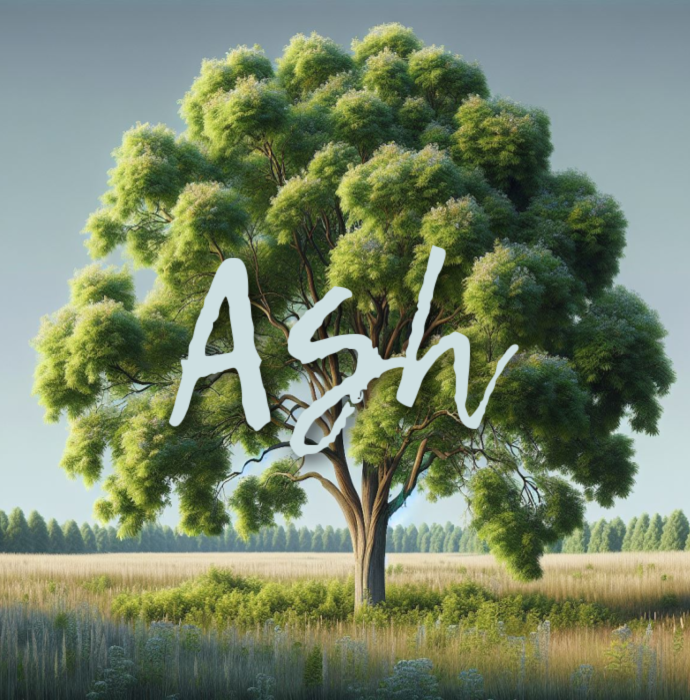
We’ve already talked about the symbolic meanings of the ash tree (see Melia, above!). But let’s talk about what a great gender-neutral pick this is! We often hear it as a nickname for Ashley, which is largely feminine (though Ashley actually used to be a boy name!). But it can also be a nickname for Ashton or Asher, two very popular male name choices.
Rowan

Derived from the Old Irish rúad, meaning “red,” the rowan tree is known for its vibrant red berries, which have been used throughout history for medicinal purposes (such as to ward off scurvy). But the rowan tree is said to have plenty of mystical properties, too. In Celtic mythology, it represents power, vision, balance, healing, mystery, connection, protection, divination, and transformation. In Scottish and Ancient Celtic folklore, the rowan tree is said to offer protection from bad luck and evil spirits.
Best of all, as a name, it’s a truly unisex pick!
Arbor

In a wooded area, an arbor is an enclosed area shaded by trees or shrubs — a cooling, protective haven. And arbor is literally the Latin word for “tree,” which makes this cool gender-neutral name a shoo-in for our list of tree names!
Cypress

If you’re into names with beautifully dark meanings, try Cypress on for size. Cypress trees have cultural and symbolic significance in many traditions, including the transition between life and death, longevity, endurance, and mourning. In ancient mythology, cypress trees were often linked to the realm of the dead, and were planted near cemeteries or used to construct burial monuments. They are are often used as a symbol of immortality and hope because of their shape that points to the sky (heaven). The cypress is very often represented on sarcophagi, and as a hard and resistant wood, it was often used to carve idols and coffins.
Linden

The unisex name Linden comes from the Old High German linta, meaning “linden tree.” The linden tree (also known as Tilia — which could make a cute name as well!) has a long history of symbolic meaning, including love, fidelity, peace, and hope. It’s also associated with Freya, the Germanic goddess of love and truth, and with the Virgin Mary. The tree’s heart-shaped leaves are also present in the Catholic Church, where it represents the “Sacred Heart.”
Cedar

The name of the cedar tree is derived from the Greek κέδρος (kedros). Cedar trees have been revered for their spiritual significance for centuries. They are associated with prayer, healing, dreams, and protection against disease. Cedar trees are also known for their longevity and resistance to decay. Because of these characteristics, the cedar has become a symbol of greatness, nobility, strength, and incorruptibility.
Oakley
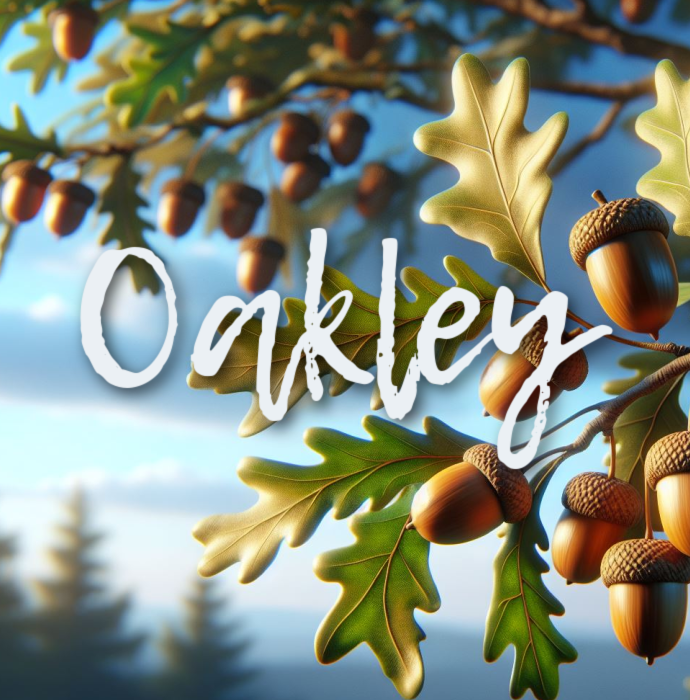
Oak trees have been revered by cultures and civilizations for centuries and symbolize strength, endurance, and longevity. The oak tree’s sturdy trunk, deep roots, and sprawling branches represent these characteristics. The acorn, the fruit of the oak tree, symbolizes potential, growth, and prosperity. Together, they embody the cycle of life, death, and rebirth — so you can pay homage to these noble qualities with the gender-neutral name Oakley. It combines the word oak with the Old English suffix -leah, meaning “clearing of oak trees.”
Garrick

Want another oak-inspired name that’s far less obvious? How about Garrick! It’s derived from the Occitan word garric, meaning “grove of oak trees.”
Alder
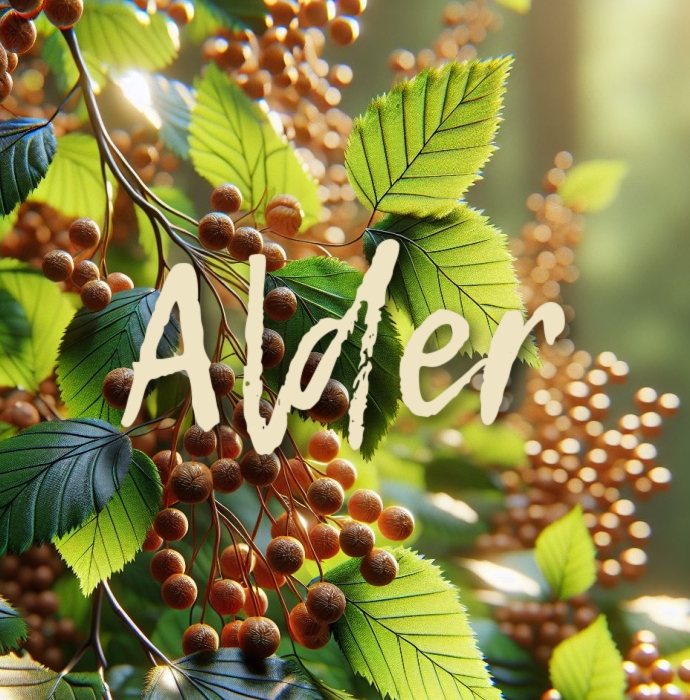
A cool fact about the alder tree: its wood is naturally a pale color — but as soon as it’s cut, it begins to turn blood-red. For this reason, the alder tree has been the subject of much superstition throughout the ages, linked to the supernatural, prophecy, and sacrifice. In ancient legend, a shield made of alder wood was said to offer the bearer extra protection and ferocity in combat.
Hawthorn
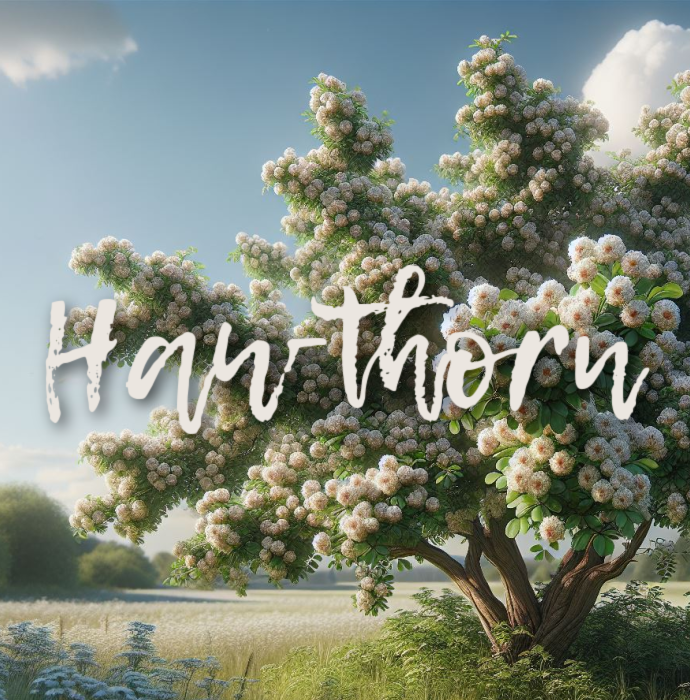
A distinguished-sounding name, in reference to a tree rich in symbolism. The hawthorn tree has a long history of being sacred and magical. Its twisted, thorny branches are featured in folklore from Greek marriage rituals to Irish fairy stories, Pagan fertility festivals, and Christian myth. For example, the Greeks carried hawthorn as a symbol of hope in wedding processions. It’s said to be both good and bad luck; good because, according to myth, fairies live in hawthorn trees — but bad luck because whoever cuts one down will feel those fairies’ wrath!
Hawthorne-with-an-e could be in homage to Nathaniel Hawthorne, as well, American author of The Scarlet Letter … so this works as a literary name too!
Oleander

The oleander tree’s presence is documented in written records from various cultures, with some references dating back as far as 450 BCE, though its journey likely began much earlier as it followed trade routes around the world. It is poisonous, so its blooms have long symbolized caution. But it also symbolizes hope and resilience; after the atom bomb decimated Hiroshima, Japan in 1945, the oleander was the first plant to bloom, and it was dedicated the city’s official flower. And in 1900, most of Galveston, Texas was destroyed by a hurricane, after which recovery efforts included planting thousands of beautiful, hardy oleanders because of their resilient nature; it’s now known as The Oleander City.
Admittedly, the name Oleander is a bit formal-sounding — but in the same way that Alexander could become Alex, Oleander could become Ollie.
Silas

Instead of naming your child after just one tree, how about naming him after an entire forest? If you choose Silas, you’ll do just that! Like Sylvia, it comes from the root name Silvanus, which means “forest.”
Koa

Natives of Hawaii, koa trees symbolize strength, bravery, and fearlessness, and is associated with the Hawaiian warrior spirit. The word “koa” means warrior in Hawaiian, and the Hawaiian saying e ola koa (live like a koa tree) suggests living with strength and having a long life. In ancient Hawaii, koa trees were used to make weapons, tools, and canoes, and were highly valued by Hawaiian chiefs and royalty. Koa is a durable hardwood that can endure abuse, and its solidity and rigidity supported ancient koa warriors in combat. Koa wood is also associated with good luck and protection for those who wear it — koa wood jewelry is often given as a gift to honor special occasions, or to show appreciation and love.
Lennox

Lennox, a tree name? Well … in a manner of speaking, yes! Lennox is a Scottish surname that originated in a Scottish district called Leamhnachd — which means “place of elm trees.” (For the lore surrounding elm trees, see the name Elowen above!)
Ewan
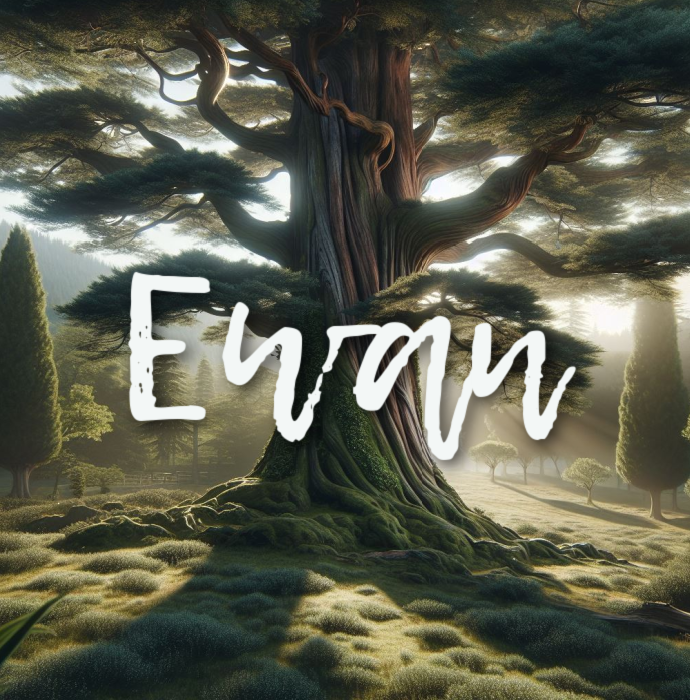
Ewan is the Scottish version of the Irish name Eoghan, which is comprised of the Old Irish elements eó “yew” and gan “born” — meaning “born of the yew tree.” The evergreen yew tree has long held a powerful symbolism. Revered by Celtic Druids for its enduring nature, it embodied everlasting life and rebirth. This symbolism evolved to encompass both death and resurrection — a concept that resonated into the Christian era. Even today, echoes of this duality persist, with yew branches carried in both Palm Sunday processions and funerals. Surprisingly, the yew tree packs a powerful punch beyond its symbolism; its leaves and bark contain taxanes, special compounds that scientists have harnessed to create modern-day cancer-fighting drugs.

